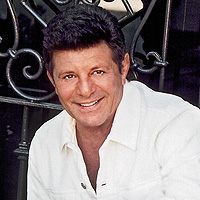 Frankie Avalon
Frankie Avalon
'Still Everyone's Teen Angel'
One of a spate of teen idols to come out of Philadelphia in the 1950s and 1960s, Frankie Avalon - unlike many of the others - actually had a musical background, having been taught to play the trumpet at a very young age by his father.
As a youth Avalon performed in local clubs and theaters. He won a local TV talent contest playing a trumpet solo. One day in 1952 he was performing at a private party held for singer Al Martino. A talent scout who was also at the party was impressed enough by Avalon to get him an appearance on Jackie Gleason's TV show, which led to more television appearances, and in 1954 he cut his own record on a small local label.
At age 12 he was in a band called Rocco and the Saints, which included another soon-to-be famous teen singer, Bobby Rydell. Avalon eventually landed a recording contract with Philadelphia's Chancellor Records, and he recorded "Cupid" and "Teacher's Pet". These records got him his first movie role, a small part in Jamboree (1957) designed to promote "Teacher's Pet."
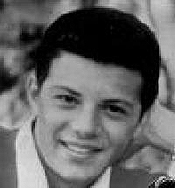 His next record was "De De Dinah", a song written by his managers. After an appearance on Dick Clark's teen dance show "Bandstand" (1952), sales of the record zoomed and it eventually sold more than a million copies. His next several songs were also big hits, and in 1959 he recorded the song he is probably best known for, the million-selling "Venus."
His next record was "De De Dinah", a song written by his managers. After an appearance on Dick Clark's teen dance show "Bandstand" (1952), sales of the record zoomed and it eventually sold more than a million copies. His next several songs were also big hits, and in 1959 he recorded the song he is probably best known for, the million-selling "Venus."
However, as 1960 rolled around his career path changed as he soon began taking small parts in movies, most notably in John Wayne's The Alamo (1960). He began to get somewhat bigger parts and had his first starring role in Drums of Africa (1963). His movie career really took off, however, when he was paired with former Mousketeer Annette Funicello in Beach Party (1963) and its string of sequels. These films, with their combination of surfing, low comedy, dancing and bikinis, struck a nerve with teenage audiences, were produced for peanuts and made a fortune.
Avalon still recorded songs for Chancellor and other labels, but now he was far better known among younger audiences for his movies than for his records. In 1985 he began touring with fellow teen idols Rydell and Fabian in an oldies show called "The Golden Boys of Bandstand," which was a rousing success. In 1987 he and Funicello were reunited in Back to the Beach (1987), an homage to, and parody of, their earlier "beach" movies.
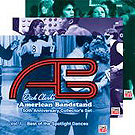 To commemorate the 50th anniversary of American Bandstand's debut, Time Life, through an exclusive arrangement with Dick Clark Productions, is releasing a 12-CD box set, Dick Clark's American Bandstand 50th Anniversary Collection. It highlights 25 years of music (spanning the late '50s to early '80s) from America's longest running music entertainment show. The collection will be introduced in a half hour music show filmed on a re-creation of the Bandstand set, featuring music and videos of the artists and classic clips of the teenage guest audience doing the latest dances on the show. The show will also sell the product.
To commemorate the 50th anniversary of American Bandstand's debut, Time Life, through an exclusive arrangement with Dick Clark Productions, is releasing a 12-CD box set, Dick Clark's American Bandstand 50th Anniversary Collection. It highlights 25 years of music (spanning the late '50s to early '80s) from America's longest running music entertainment show. The collection will be introduced in a half hour music show filmed on a re-creation of the Bandstand set, featuring music and videos of the artists and classic clips of the teenage guest audience doing the latest dances on the show. The show will also sell the product.
Along with Frankie also co-hosting will be an '80s popular music icon, Deborah Gibson. The show will air nationally beginning on August 24th to coincide with the collection's official release date.
Is it true that whilst in Rocco and the Saints local impresario Bob Marcucci came to discover your lead singer Andy Martin, but decided that you were more the one and inked a management contract with you immediately? Frankie - "Absolutely. Originally I was a trumpet player with that band, but periodically I would do some singing. I would sing maybe three songs in the course of five sets for the evening. So I was really not the singer I was the musician trumpet player. But when he did come in, the guy who started this record company and his partner; who were looking for new young people with different sounds, I did a couple of songs within that set. So, I came off stage and he said that he loved the band, that he wanted to sign us to a contract, but he wanted me to be the lead singer. So, he's really the one responsible for me making the transition from really just a musician to a vocalist."
What did then-singer Andy Martin think of this new move? "We've still retained our friendship for a long, long time and he went on his way and I don't think there was any animosity whatsoever. And now we just reminisce about our days together as band members, you know."
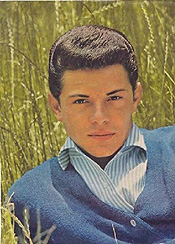 It’s been claimed that you were the first of the manufactured teen idols, before Fabian and Bobby Rydell and all the others. Do you agree with this? "No, I don't. I don't agree because if I were that manufactured I'd have been a hit right out of the box with my first release. But that didn't take off, neither did my second one, neither did my third one. It was only my fourth song that was released that became the first hit."
It’s been claimed that you were the first of the manufactured teen idols, before Fabian and Bobby Rydell and all the others. Do you agree with this? "No, I don't. I don't agree because if I were that manufactured I'd have been a hit right out of the box with my first release. But that didn't take off, neither did my second one, neither did my third one. It was only my fourth song that was released that became the first hit."
Is it true that for some of your earlier songs - even such as your first hit ‘De De Dinah’ - that you pinched your nose while singing the song to show just how you felt about being told how and what to sing?! "Yes, I can clear that up because after my third release I had four sides to do. And it was the last record on my deal to go into the studio and so when I heard the rhythm of the song called 'De De Dinah' it sounded very staccato to me. So, I just started fooling around with it. I didn't literally, actually, physically pinch my nose, but what I did was I started singing through my nose with a very nasal quality. And the A&R man asked me what I was doing, I told him I was just fooling around. So he wanted to take a few like that ... so we did. Indeed, that was the one that he put out!"
As you kept having hit after hit after hit at what point did you realize that you had turned into a music Idol? "I would probably say 1958 is when it really started to happen for me. What happened was 'De De Dinah' came out at the end of '57 so by the time '58 came along I was then climbing the charts. And I had signed to do 91 Night Concerts on a bus tour - which was a school bus - and I was on the bill of a show called 'The Big Show of Stars 1958.' And I was one of the guys starting to sell records, because I was on that bus tour with The Everly Brothers, Sam Cooke, Dion, Jackie Wilson and about 15 others - all sitting on this bus doing 91 nighters around the United States."
"But as I started to go about two weeks out I started to gain more momentum and then all of a sudden the headlines and billboards - which I still have and have them laminated - said, 'Avalon Stands Out In Rock 'N Roll Show.' And that was really the first time that I realized that Jesus, things are really starting to happen for me. And so then I got all the screaming kids and the police protection and became one of those guys that they then called a 'Teen Idol'."
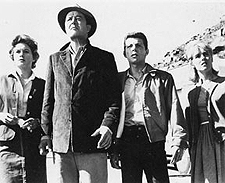 Being that 1962 saw the end of your four-year domination of the music charts, but at the same time heralded the arrival of your on-screen partnership with Annette Funicello, I'm wondering if it was an easy transition for you? "Well, I was very fortunate to have made that transition. I had done other films before the Beach Party series - I did a film with John Wayne, Alan Ladd, Walter Pidgeon, and I'd done pictures with Robert Wagner and Ernie Kovacs. So I was making films but then when the career started to dwindle in music it was because The Beatles had come along and the styles had changed."
Being that 1962 saw the end of your four-year domination of the music charts, but at the same time heralded the arrival of your on-screen partnership with Annette Funicello, I'm wondering if it was an easy transition for you? "Well, I was very fortunate to have made that transition. I had done other films before the Beach Party series - I did a film with John Wayne, Alan Ladd, Walter Pidgeon, and I'd done pictures with Robert Wagner and Ernie Kovacs. So I was making films but then when the career started to dwindle in music it was because The Beatles had come along and the styles had changed."
"So yes, the change happened around me, but fortunately I kinda snuck into another door and started those Beach Party films that became extremely successful."
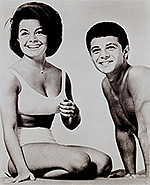 Did you ever have a more personal relationship with your leading Beach Party lady, Annette Funicello? "Well, in the very beginning when I first met her she must have been about 15 or 16. And of course I'd seen her on the Mickey Mouse Club. But no, I never did. People only assumed that we did 'cause we worked together. But we played the Hollywood Bowl and I was about 3 or 4 years older than she was and met her again, thought she was very attractive and adorable and exchanged numbers. And I did call her house and a few times went and dated her. As far as young peoples dates went, which was a slice of pizza and maybe a movie. But that was about it."
Did you ever have a more personal relationship with your leading Beach Party lady, Annette Funicello? "Well, in the very beginning when I first met her she must have been about 15 or 16. And of course I'd seen her on the Mickey Mouse Club. But no, I never did. People only assumed that we did 'cause we worked together. But we played the Hollywood Bowl and I was about 3 or 4 years older than she was and met her again, thought she was very attractive and adorable and exchanged numbers. And I did call her house and a few times went and dated her. As far as young peoples dates went, which was a slice of pizza and maybe a movie. But that was about it."
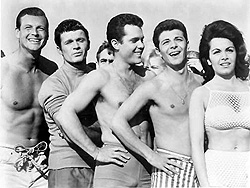 When you look back at those Beach movies do you laugh, cry ... or even hide?! "No, I enjoy them. I get a big kick out of them. It's funny I'll pass by a TV or be changing channels and so I'll stop for a moment or two. And what brings back memories to me was what was happening when we were shooting the scenes. And I loved the camaraderie of the cast. We really became friends. It was like an ensemble because we did one picture after the other and we were all friends. You know, we made those pictures in 15 days and the cost of it was $350,000 to make. They were a lot of fun and everybody just had a good time."
When you look back at those Beach movies do you laugh, cry ... or even hide?! "No, I enjoy them. I get a big kick out of them. It's funny I'll pass by a TV or be changing channels and so I'll stop for a moment or two. And what brings back memories to me was what was happening when we were shooting the scenes. And I loved the camaraderie of the cast. We really became friends. It was like an ensemble because we did one picture after the other and we were all friends. You know, we made those pictures in 15 days and the cost of it was $350,000 to make. They were a lot of fun and everybody just had a good time."
So why then did you stop making the Beach movies when you did? "Because things had changed. With the same thing that happened with The Beatles bringing in their music all of a sudden this world changed also. We were really in the depths of the Vietnam War and, of course drugs came into view. Politics were very important and the young people all of a sudden started to voice opinions of what was right and wrong to them. So there was a tremendous change then."
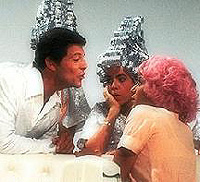 Tell us more about your 1978 cameo role in the musical "Grease" playing Teen Angel and singing "Beauty School Dropout." How did you get that part? "Well, what happened was that I had seen the original play on Broadway way back in '71 - I was playing the Copacabana at the time - and I went to the show as they had a little press thing. I enjoyed it as it was my generation, my time then which they were kind of poking fun at."
Tell us more about your 1978 cameo role in the musical "Grease" playing Teen Angel and singing "Beauty School Dropout." How did you get that part? "Well, what happened was that I had seen the original play on Broadway way back in '71 - I was playing the Copacabana at the time - and I went to the show as they had a little press thing. I enjoyed it as it was my generation, my time then which they were kind of poking fun at."
"And time had gone by and about another 6 years later they were making a film out of it. I was playing golf and so I come off the golf course and my manager's there with a script saying that Paramount wanted me to do this film. I looked at the title which said 'Grease' and asked what role and he said Teen Angel ... and I said 'Pass'! He asked way and I told him that I saw the play and Teen Angel 'came off of a rope, he's all in black, he's got long sideburns and he gyrates.' And to me it was just an extension of Elvis. I had my own style and so it didn't fit me. So, I went back out on the course and played the second nine holes and came back in and he was still there with the script. He told me they wouldn't take no for an answer and that they wanted to see me. So, I said OK - 'cause I knew Alan Carr from previous things - and so I went into Paramount and we sat down and I told him the story. And he said, 'We'll change it. We'll do anything you want'."
"So, they changed the look of the character to all white coming out of the heaven's with a whole different approach and my style of vocal and I said, 'OK, let's do it'."
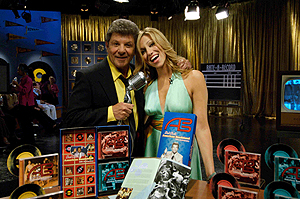 Tell us more about when Time Life approached you to be a spokesperson for this 50th Anniversary American Bandstand box set "That was an immediate yes. First of all because I'd worked for Time Life previously and they're a great company. But also my association, my friendship and gratitude to Dick Clark and what he's meant to this industry of music, and to fashion, and to styles, and to people for the last 50 years. I was honored when they asked me to co-host it. They told me they would be recreating the sets of American Bandstand and you'll be kinda like a pseudo Dick Clark explaining to everybody what this box set is all about."
Tell us more about when Time Life approached you to be a spokesperson for this 50th Anniversary American Bandstand box set "That was an immediate yes. First of all because I'd worked for Time Life previously and they're a great company. But also my association, my friendship and gratitude to Dick Clark and what he's meant to this industry of music, and to fashion, and to styles, and to people for the last 50 years. I was honored when they asked me to co-host it. They told me they would be recreating the sets of American Bandstand and you'll be kinda like a pseudo Dick Clark explaining to everybody what this box set is all about."
"And this really is a great package as there are four different generations that can relate to this box set of four decades - at least the '60s, the '70s' and the '80s. And it's music from those four decades that I don't care if you were a fan of the '50s and didn't know too much about the '80s, when you hear those songs that are from the '80s you're gonna say, 'Oh yeah, I know that song too.' So, everything is a hit song and a wonderful package for a collector of over 200 songs. There's also a booklet with the package and there's a DVD that represents ten different classic interviews that Dick Clark did. I'm very proud to be a part of it."
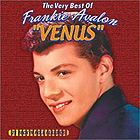 Is there still to this day one of your songs that is still your go-to song for remembrance? "I guess the most memorable for me is when I had the number one song 'Venus.' I came out to do the song on American Bandstand, as it was number one then, and unbeknownst to me Dick Clark said he had a little surprise for me. And so just before I did the song he said, 'Frankie Avalon, here's your first gold record.' And so he presented me with my first gold record right there and then on TV! That's the most memorable."
Is there still to this day one of your songs that is still your go-to song for remembrance? "I guess the most memorable for me is when I had the number one song 'Venus.' I came out to do the song on American Bandstand, as it was number one then, and unbeknownst to me Dick Clark said he had a little surprise for me. And so just before I did the song he said, 'Frankie Avalon, here's your first gold record.' And so he presented me with my first gold record right there and then on TV! That's the most memorable."
Will there be new music from Frankie Avalon at some stage in the near future, perhaps? "You know, I really don't think so. Though I should never say never, but at this point I don't think so. I tell you what I do think, I think music is really taking a turn. I think we're going back to some good stuff again. With the success of High School Musical 2 and with what the kids are doing performance wise - they're singing songs, they're dancing, they're doing light comedy - they are role models. And all those things are some great indication that there's some wonderful talent out there now. I love Michael Buble ... and there's a lot of other good people out there now and it's starting to come around."
"I think people want to hear good songs and I think that's the key. Good singer's, there's a lot of them around, but good songs are hard to find."
Can an original song still be written though? "Yeah, I think so if you give the opportunities to the song writers. You see that's what it used to be, Russell. There used to be a thing called Tin Pan Alley, so to speak. A place where there were song writers and publishers, and then there were the artists and the A&R men. And then there were the producers. So the song writer or the publisher would bring material that they had written for specific artists to them. And the producer would then bring it to that artist. And then you would say yes or no together. And if you liked it you would go into a studio with a great song. But what's happened through the years is that - and I'm not saying all of them - but the majority of the artists through the years after that became their own song writers. Which meant that only that artist who was the singer could only sing the song that he wrote. Where on the other hand, if it's a good song written by somebody else anybody could sing it."
Finally, will you ever bring out an Autobiography for your fans? "I have a project that I've been working on for a while now and it's called 'The Rock Garden.' It's a story about that tour that I mentioned earlier, the 91 Nighters with all my friends. And it's a very hard hitting piece of work. Not only about the inception of where we were all going at the time, but a lot of elements in there - the racial end of it at that time - and what was going on in the country and how the simplicity wasn't where it ended up after that tour."
Interviewed by Russell A. Trunk
www.FrankieAvalon.com
www.TimeLife.com
Back To Archives

